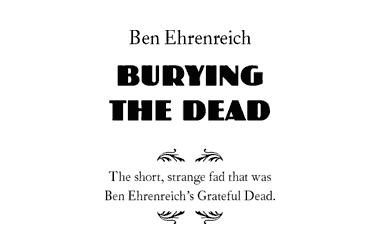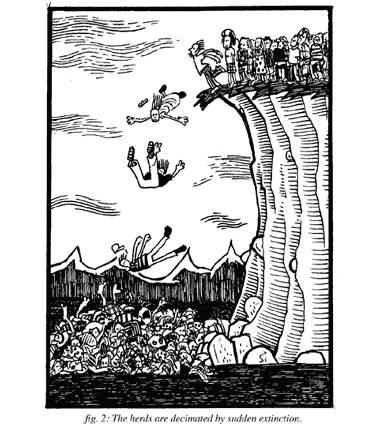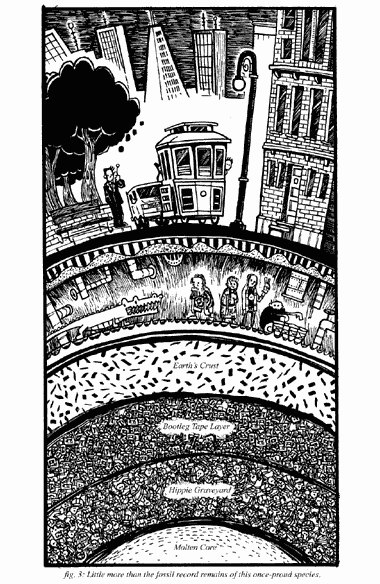
When at last the realization came, I felt relieved. Vindicated. Forgiven, almost. It was five years ago in Venice Beach, California. I was strolling the boardwalk, showing off L.A.'s touristic offerings to a friend from out of town. We shuffled through the stalls selling tie-dyed t-shirts and hand-woven Guatemalan pants, past tables of dancing bear stickers, incense and aromatic oils. Maybe it was that sick, sweet smell that triggered it, or maybe it was the slow, stoned California cadences of the vendors' voices that brought it on, but it was suddenly clear to me why I felt so uptight, angry, depressed – why I'd always felt the same way on Haight Street in San Francisco, on Telegraph Avenue in Berkeley, sometimes in Washington Square Park.
How could I not have known? It was so simple: I hate hippies.
I had tried to like them, had tried not to wince when straggly-bearded strangers called me "brother" (usually while asking for a cigarette), to bob my head with the requisite enthusiasm at endless, arrhythmic drum circles. I had failed in these efforts, had never known why, had imagined something lacking in myself. Now I knew why. It was so simple, so pure. I hated hippies. I hated their substitution of high-ground posturing and (truly dreadful) fashion for real moral passion; hated the creeping insistence that you relax, check out the butterflies and flowers and, as Jerry Garcia put it, "make yourself easy"; hated that distinctive pairing of vapid righteousness and intellectual indolence; hated their lunk-headed embrace of that supposedly nurturing goddess, Nature; hated the intensely passive-aggressive denial of the reality of human conflict, which they have boiled down with uncharacteristic efficiency into two facile, stupid words: "Peace, brother."

It was a terrific relief to, as the therapists put it, let myself feel, but it didn't last long. I was surely implicated. For not only had I mysteriously suppressed the truth of my emotions for years, but I had, in a brief, dark period of my youth, about which I have heretofore avoided all mention even to intimate friends, taken up the enemy banner. I was a fan of the Grateful Dead.
"Wait," you say. "The Grateful Dead, a fad? The Grateful Dead, whose central symbol was the long, strange trip, two and a half decades (or was it three?) of pied-piping about the world, from Giza to the Garden, a florid train of greasy waifs in tow? This surely was an institution, not a fad."
But a fad it was for me, perhaps the only mass cultural phenomenon I've fallen into as a legal adult, excepting the Powerpuff Girls and some of the sleazier reality TV shows. Like a brief, intense love affair long past, I find this passion nearly inexplicable now, almost opaque. It is the mandate, though, of the Christian sages and the elders of pop-shrinkdom alike that to be reconciled with either God or Self, we must unearth our buried sins and seek not only forgiveness but the strength to forgive. So let us travel back together and wonder with open hearts at this slender boy of 18 years, shirtless, a tie-dyed teeshirt stuffed into the back pocket of his tattered jeans, his acned shoulders burned by the sun, his pupils swollen the size of dimes, synapses blasted open in lysergic bliss, head bobbing like a metronome to that most monotonous of tunes, "Terrapin Station," as countless thousands of tie-dyed others bob alongside, swaying and wriggling rhythmless in a stadium-wide hippie shuffle.
How did he get here? Just a few months before he – forget the ruse, I – could be found wrapped in a thrift-store overcoat, pockets bristling with paperbacks of Nietzsche, Dostoevsky and Sartre. I was a glowering, bookish adolescent who wore a scowl like a dandy's silk scarf and favored the more fey and arty varieties of latter-day East Coast punk. A few months later, I had hidden my tie-dyes deep in a drawer, sprouted sideburns, begun reading Guy Debord, Hakim Bey and Bakunin, and returned to my geek-rock roots.

In between, though, I was a devoted fan. Never a full-out deadhead, but a fan. My romantic entanglement with the Grateful Dead lasted only about a year and a half, just after I turned 18. It's all a bit hazy now, but I attended between six and ten concerts, and loitered ticketless in the parking lot for maybe another half dozen. Any proper 'head would scoff at such amateurism. I never followed the band, though my travels around the country coincided closely – some might say suspiciously so – with the Dead's tour route. I bought and/or lifted only three or four cassettes of their music and was never infected with the bootleg tape obsession common among so many Deadheads.
More dedicated fans gave up school, work, everything, and hustled their way at least to the parking lot of dozens of shows each year. Failing that, the less nomadic and more affluent fans collected bootlegs. I knew 18-year-olds who owned hundreds of concert tapes and could recite the full set lists of shows that occurred years before they were born. They could debate for hours about which among thousands was the best performance of "Dark Star" or "Wharf Rat," or how long it had been since the Dead played "St. Stephen" and what signs and portents suggested the band might play it again, topics which usually sent me off wandering in search of some nice streetlamps to look at, or maybe an interesting puddle.
When confronted in the years since my infatuation waned, I have claimed I was only in it for the drugs. This effectively silences most inquiries, but is only partly true. I had never tried LSD before my first Grateful Deasilenced concert. I had been eager, as every sane suburban youngster is, to escape the drab daily confines of the world, a self bounded everywhere by banality, a life that seemed to stretch forth like a fluorescent-lit hallway of locked doors painted gray. Acid, it was rumored, was the key. And what better place for it than an arena filled with several thousand googly-eyed co-conspirators, with a house band whose endless psychedelic noodlings, though grating to the non-tripping ear, seem designed precisely to guide the daytripper up and down and all around his or her freshly expanded noggin?
I don't remember much about my first show. It was at the Meadowlands in northern New Jersey. I remember overhearing a pretty girl tell her friend she wanted to kiss me, and being too shy to take her up on it. I remember that tiny square of paper dissolving tasteless beneath my tongue and Jerry Garcia's sudden, surprising transformation from grubby fat man to beneficent patriarch dispensing chords like candies. I remember singing along to songs I had never heard before that day, my voice dissolving in the crowd's collective hum. I remember gazing into the eyes of a lost dog in the parking lot and feeling every heartbreaking stitch of its desperate, anxious need. I remember, in the car on the way home, seeing a truck bearing the initials of the Guaranteed Overnight Delivery shipping corporation and cackling with delight at the thought that they'd managed to cram God into the trailer. But mainly I remember the light pouring in, the sky-blue sunshine flowing in through my corneas and dissolving all the hard corners of my mind. I was converted.
In the months that followed I would listen to the Dead's music in my car on my way to one shitty job or another, driving home from my girlfriend's house late at night, or in friends' bedrooms on long, stoned, beer-sodden afternoons. I would learn the songs, and learn to like a lot of them. They offered a hint, a trace memory of that acidy dissolution, that oceanic togetherness and nowhereness I had only just tasted. For a kid from the 'burbs, chafing at the limits of his own over-busy consciousness and the revoltingly narrow possibilities the adult world seemed to be selling, there was little to look forward to except the next Dead show. Less than little. Nothing.
I would see them again at the Meadowlands, at Madison Square Garden and up in Boston, all the way across the country to San Francisco and back east again. I would find things to love in the parking lots and in the hallways of the arenas. Strange, clumpy pyramids of naked deadheads writhed intertwined in asexual hallucinogenic ecstasy. Angel boys stood wide-eyed and grinning on the same square of asphalt for hours. Angel girls spun in the same tight circle all night, bells jangling on their ankles. Freaks could be happy here. And though I looked more clean-cut than most of the kids around me, I certainly felt freaky. Food and drink were shared freely, drugs and even tickets too. You could count on running into the same people from city to city, grimy nomads who would find you among thousands of unknowns and greet you with unfeigned warmth. There was a skinny, straggly hippie named Weasel whom my friends and I saw at almost every show, who each time gleefully remembered us as the ones who had confused him with his friend Squirrel. (We had not.) There was a kid I'd gone to school with who in four years of high school had been so depressed and withdrawn I'd never heard him say a single word. At Dead shows he skipped around like a baby lamb. It was hard to make him stop talking. He'd found a home.

It gradually became clear that I had not. It was in the parking lot of the Oakland Coliseum that the romance began to sour. I cannot pinpoint the cause. There were things that began to annoy me, but none of them alone amounted to much. It was like that fatal moment when, although nothing concrete has changed, you begin to notice all of a lover's flaws and blind yourself to her virtues.
I had driven across the country with two friends. We lost our transmission crossing the Oregon-California line and got stuck in Crescent City waiting for the rebuild that would eat up all our savings. We made it down to Oakland, but on our second day there, the house in which we were staying burned to the ground in a wildfire. We escaped intact and found a place to crash in San Francisco. The three of us shared a single job for a week, delivering American flag doormats, trash bags and bulk light bulbs for a somewhat dodgy veterans' charity, making just enough each day to pay for dinner and a communal pack of cigarettes. A family friend found two of us another job at a construction site in Emeryville. Then the Dead came to town.
They played three shows in Oakland, maybe four. We drove straight from work to the Coliseum, stopping on the way to buy beer to sell in the parking lot, hoping to raise enough cash to cover the tickets. I knew Coors wouldn't fly with the Deadheads, so we bought Budweiser. I wandered through the carnival of cars and vans and purple-painted buses, among pot-bellied men and flower-crusted children, and hawked beers from the cardboard case at a dollar a can. When I wasn't being chased by security guards protecting their employer's monopoly on alcohol sales, I managed to sell a few. Mainly, though, I got a fast tour of the depths of hippie righteousness. There were the wildly passive-aggressive rhetorical devices of Deadhead beggary – in which the constant requests for free beer were voiced with the words, "Brother are you kind?" (I usually was, and hated myself for it.) There were the many incoherent lectures I received on the evils of the Anheuser-Busch corporation and its foul progeny, Budweiser. That beverage, I was informed by one batiked and dreadlocked young woman, was responsible for the helicopters, you know, the helicopters, the ones in El Salvador or maybe Angola or was it Laos? – the ones they used to swoop down and shoot the poor people.
"Don't buy Budweiser," she scolded.
"You do your thing," I told her with impeccable West Coast logic, "and I'll do mine."
The next day we brought Sam Adams.
Only on one night did we make enough money for tickets. I don't remember the show at all, what songs the band played or what drugs I took, only the nightly ritual of weaving our way back across the Bay Bridge to San Francisco for a couple hours of sleep before we would have to fight our way to consciousness again, figure out where we parked the damned car, drive back across the Bay to pound nails for eight hours in Emeryville, and start the cycle over. Very few of the nails went in straight. We were fired at the end of the week.
The Dead left town and we headed east not long after. Before we left San Francisco, someone smashed a window and yanked out our car radio, so we wouldn't hear another "Uncle John's Band" or "Ripple" for three thousand miles, just the rush of cold air where the window had been. I wouldn't have admitted it then, but I was happy for the break.
I went to a couple of shows after that, all back east. I enjoyed myself, enjoyed my friends' company, but there was a thin, strained quality to the pleasure, like the final kiss after you've realized the crush is gone. The last concert I can remember was on Long Island, at Nassau Coliseum. I don't think we got into the arena but just took in the scene in the parking lot, where I recall taking a surprising satisfaction from the sight of two dogs fighting, all snarl and tooth and yelp, upending tables stacked with veggie burritos and crystal pendants. The Deadheads looked on in paralyzed horror, no one knowing what to do about this flagrant canine flouting of the ethic of peace and mellowness. I rooted for the dogs.
The news came a couple years later. I was living in southern Mexico, flirting half-heartedly with a revolution that didn't notice me at all. I phoned an old friend from home to catch up. He told me our friend Paul had broken his neck, diving drunk from a rooftop into a swimming pool, missing the pool. Also Jerry Garcia had died. The Dead were dead. The long, strange trip was over. I was worried about Paul and barely heard the other news at all. After a week or two, I called again. Paul, astonishingly, was fine, but Jerry never recovered. Neither did the Deadheads: The whole motley army was cast adrift, forced to disband and disperse, or to humiliate themselves chasing shadows, following Phish. I haven't kept track. I don't wonder how they are or where they've gone or why, if it was they who betrayed me or I them, if I gave up on something or just learned to search it out elsewhere, or if my hatred gets me off the hook.

Illustrations by Matt Wiegle.
Back to Top | Table of Contents | Subscribe to Topic

|

